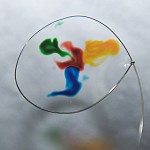Food coloring may be linked to hyperactivity in children after all
Food coloring and additives have been implicated before in hyperactivity in children, but U.S. health officials said then that there was no study to support claims that the dyes can cause health problems.
But now the U.S. Food and Drug Administration is giving the issue a second look. On Wednesday, the FDA will convene a panel of advisers to reassess any links between food coloring and behavioral problems.
A possible recommendation by the panel is to require food manufacturers to add health safety warnings on food packages.
In a report by the same agency, researchers said that children with no known behavioral problems are unlikely to be harmed by eating food with artificial food coloring. But they said that those diagnosed with mental conditions will have symptoms "exacerbated by exposure to a number of substances in food, including, but not limited to, synthetic color additives."
Consumer groups and parents point to mostly anecdotal evidence linking food coloring to children's behavioral issues, and most experts say the concerns about dyes in food are unfounded.
The FDA has noted the lingering fears over the years but has stopped short of banning the additives it deems harmless. In the past decades, many dyes have been found toxic through studies and have been subsequently banned. But the remaining approved dyes used by the food industry have not been established to have toxic properties and are continued to be permitted to be used.
Current regulation requires food products to state the type of food coloring used in their products.
